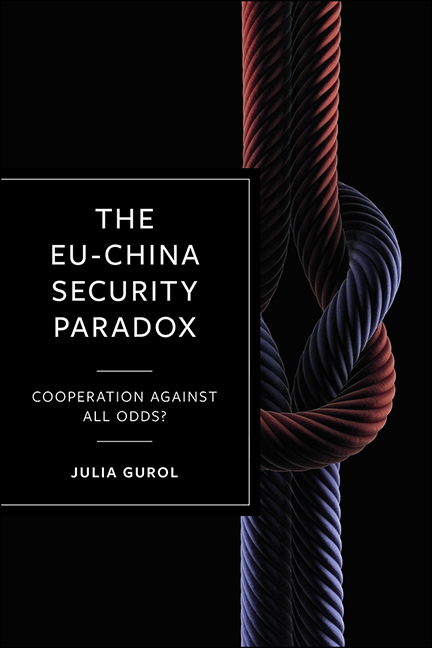Book contents
- Frontmatter
- Contents
- List of Figures
- List of Tables
- List of Abbreviations
- About the Author
- Acknowledgements
- 1 The EU and China in a Changing International Environment
- 2 Analytical Framework: Towards Multidimensionality
- 3 The EU’s and China’s Foreign and Security Policy Principles
- 4 The EU and China on the Global Stage: Interests and Interdependence
- 5 Framing and Perceptions in EU–China Security Relations
- 6 EU–China Relations on Anti-Terrorism
- 7 EU–China Relations on Maritime Security and Anti-Piracy
- 8 EU–China Relations on Climate and Energy Security
- 9 The US: An Elephant in the Room for EU–China Security Relations
- 10 Conclusion and Outlook: The EU and China at a Crossroads
- Notes
- References
- Index
7 - EU–China Relations on Maritime Security and Anti-Piracy
Published online by Cambridge University Press: 15 September 2022
- Frontmatter
- Contents
- List of Figures
- List of Tables
- List of Abbreviations
- About the Author
- Acknowledgements
- 1 The EU and China in a Changing International Environment
- 2 Analytical Framework: Towards Multidimensionality
- 3 The EU’s and China’s Foreign and Security Policy Principles
- 4 The EU and China on the Global Stage: Interests and Interdependence
- 5 Framing and Perceptions in EU–China Security Relations
- 6 EU–China Relations on Anti-Terrorism
- 7 EU–China Relations on Maritime Security and Anti-Piracy
- 8 EU–China Relations on Climate and Energy Security
- 9 The US: An Elephant in the Room for EU–China Security Relations
- 10 Conclusion and Outlook: The EU and China at a Crossroads
- Notes
- References
- Index
Summary
Introduction
When the EU and China talk about maritime security in the context of anti-piracy, it is mostly in reference to the Gulf of Aden (GoA), between the coastlines of Yemen, Somalia and Djibouti. The GoA is part of the broader Arabian Sea and a maritime region of utmost geopolitical importance. Few international sea lines of communication (SLOCs) are under as much scrutiny as those that cross the Arabian Sea (Gurol and Shahmohammadi, 2019). The most crucial strategic hubs in the Arabian Sea for both the EU and China are the GoA, the Strait of Hormuz in the Persian Gulf and the Bab al-Mandab Strait. All three SLOCs provide vital links to the trade routes between the Mediterranean and Asia. Increased globalization has rendered access to maritime trade routes more important than ever, because the seas are communication and transportation facilities on a global scale (Hamza and Priotti, 2020). The key East-West SLOC that runs through the Suez Canal and connects Africa and Asia to the European market passes through the GoA. In addition, the majority of vessels that cross the Suez Canal need to pass through this maritime strait. In the past 20 years alone, the overall volume of goods transported by sea has increased from 2.6 billion tonnes in 1996 to more than 10 billion tonnes in 2015, according to the United Nations Conference on Trade and Development (UNCTAD) (UNCTAD, 2016). An estimated 4.8 million barrels per day of crude and petroleum products were moved through the Bab al-Mandab Strait in 2016, with about 2.8 million barrels going north towards Europe, and another 2 million moving towards Asia (Cordesman, 2015; Lee, 2018). More than 20,000 merchant ships pass through the GoA every year, with a freight volume that accounts for about one-fifth of the world's total sea cargo (EIA, 2019). In this context, it has become crucial to secure these strategic SLOCs to guarantee the safe and uninterrupted flow of trade.
Because of its strategic trade location and significance for global trade and shipping, the GoA has become the world's most common target of pirate attacks on merchant ships in the past two decades.
- Type
- Chapter
- Information
- The EU-China Security ParadoxCooperation against All Odds?, pp. 99 - 115Publisher: Bristol University PressPrint publication year: 2022



